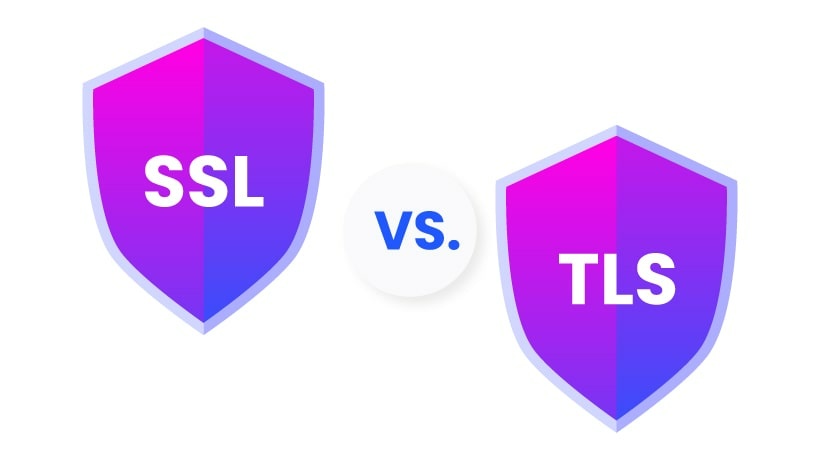SSL and TLS protocols work on the handshake process taking place between the client and browser. TLS is the ensuing version of the SSL that works like an SSL.
SSL vs. TLS is a concept that remains the talk of the town. Many people have a dilemma regarding these security protocols. However, SSL and TLS are security protocols that create a secure connection between the client and the server. Still, there are some differences in terms of cipher suites, handshake processes.
In this article, we attempted to bring some differences between SSL vs. TLS to clear misconceptions.
History of SSL
SSL was developed in 1994 to provide security for online communication between the server and the client. Netscape developed SSL; however, SSL 1.0 was never released due to a serious flaw in the protocol, while SSL 2.0 was deprecated due to security flaws.
After 2.0, SSL 3.0 came into force and was published by the IETF, represented in RFC 6101. However, SSL 3.0 was also found vulnerable against POODLE attacks; as a result, it was deprecated in 2015.
History of TLS
TLS is a succeeding version of the SSL protocol named Transport Layer Security. it also comes with different versions. TLS 1.0 was the successor of SSLV. 3.0 was released in January 1999 but was replaced with TLS 1.1 soon due to a downgrade connection vulnerability.
TLS 1.1 was able to protect against Cipher Block Chaining attacks. However, Google and Microsoft, along with Apple, announced to deprecate both TLS 1.0 and 1.1 versions. After that, TLS 1.2 was released in 2008, considering the specification of hashing and client and server algorithm. Moreover, it allows authenticated encryption.
TLS 1.2 can estimate the length of data on the base of the cipher suite. After TLS 1.2, TLS 1.3 was released in 2018, with different features that separate it from previous TLS versions.
Few features of TLS 1.3 are discontinuing of SHA-224 and MD5 algorithm, requires digital signature during old configuration, need of PFS (public forward secrecy) during the public key exchange, encrypted handshake messages. The below image shows a simple explanation of the encryption and decryption process.
Why do you need an SSL/TLS certificate?
SSL security is the backbone of any website, either you run a small business, blog, forum website, or any medium to large website. Without an SSL certificate, your website is at risk of data theft, phishing, MiTM attack.
SSL secures in-transit data with strong encryption between the client and the server. SSL certificate turns HTTP URL into HTTPS URL- a secured site on which visitors can put complete trust. The rising threat scenario has made website owners think about site security. SSL certificate works on a few factors including, algorithm, encryption, public and private key sizes.
However, SSL was misjudged due to its high latency and protocol overhead, but with the introduction of HTTP/2, the overall latency is reduced, and the website speed also increased.
“It takes 20 years to build a reputation and few minutes of cyber-incident to ruin it.”
– Stephane Nappo
Cyber attackers can find loopholes in your site and take advantage. If there is no SSL then, the information flowing between two ends remains in plain text that can be easily read and altered.
An SSL certificate works as an encrypted tunnel that allows encrypted connection and avoids any third-party intervention to overcome this issue. There are few statistics we share below that shows how SSL is adopted among the globe for website security.
Few Facts About SSL Security
According to the Builtwith report, nearly 156,979,428 SSL certificates have been deployed on the entire internet.

According to the SSL Pulse report, 45.9% of sites are secured out of Alexa’s list of 150,000 top-ranked websites.

There are 136,108 that comes to 99.3% sites that use strong cipher suites (128-bit or more) and only 962 sites that are still using weak cipher suites.
Besides the statistics, below are a few reasons that reveal the reason to have an SSL/TLS certificate for our website.
- For better search ranking
- Protection of confidential data
- Identity Assurance
- Comply with PCI/DSS requirement
- Improves customer trust
- Security for PII (Personally identifiable information)
- Strong encryption for online information
- Reduces MiTM, data theft attacks
- Proves Business Authentication
- Creates a safe shopping experience
Conclusion
finally, It is time to understand the importance of website security. Meanwhile, the concept of SSL vs. TLS and the importance of SSL certificates is now comprehended. In this rising threat environment, the digital certificate is of utmost importance. Therefore, buying an SSL certificate for your website is an indispensable step if you missed it anyhow in early time.

